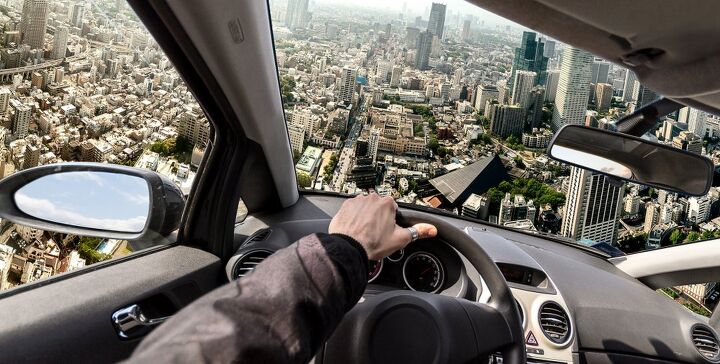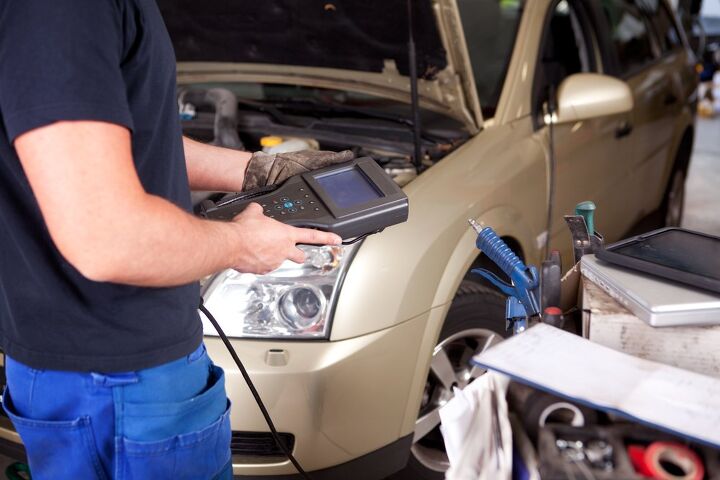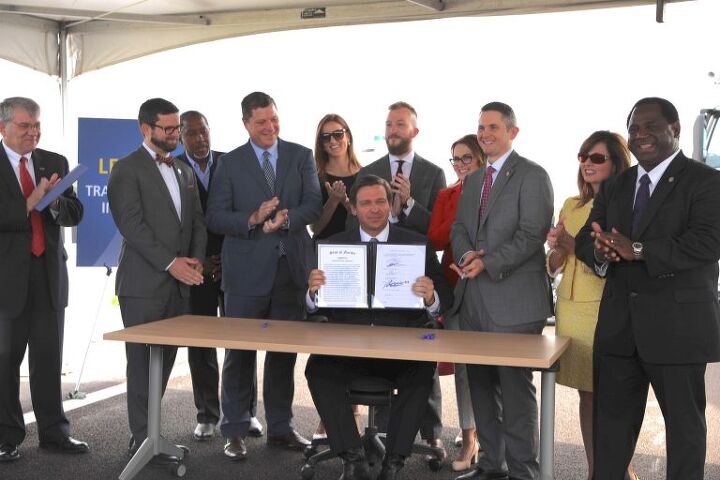#laws
Freedom: New Hampshire Legalizes Flying Cars
Last week, New Hampshire became the first state to grant flying cars access to public roadways, despite the fact that they don’t currently exist.
That said, House Bill 1182 only references “roadable aircraft,” with an aim to establish a commission to study the on-road usage of non-traditional motor vehicles. While flying cars remain anchored to our collective imagination, airplanes that can be rigged to drive on public roads technically already exist.
New Hampshire is just attempting to give them some leeway via the bill while also slipping in some new laws making it easier to revoke licenses if someone ever refuses to take a blood test, as well as withholding motor vehicle registration renewal privileges to anybody found driving in a “manner that evades toll collection.” There are also numerous revisions to construction projects related to tolling within the state. You didn’t think Bill 1182 would just be about establishing inspection and registration requirements for flying cars, did you?
The Hero We Need: Consumer Access to Repair Coalition
When it comes to activism, it’s best to choose your battles carefully. Fortunately, there aren’t too many causes within the auto industry and most are easy to get behind.
Even though environmental activists sometimes find themselves at odds with reality, their hearts are usually the right place, and they’ve encouraged automakers to try new and interesting things with transportation. Safety advocates can likewise go overboard, but we wouldn’t have seen cars get dramatically safer (or heavier) since the 1970s if they hadn’t.
Our favorite has to be consumer advocacy, however. With the exception of the occasional predatory lawsuit looking to take advantage of a dumb corporate decision, there’s precious little to scoff about. It also tends to overlap with our pet peeves by decrying bad business practices within the industry. Case in point, the Consumer Access to Repair Coalition has recently asked Congress to rethink how vehicular data is shared — noting that automakers shouldn’t need real-time monitoring for repairs and that the technology likely poses an unnecessary security risk.
States Begin Dealing With Driving Data, Right-to-Repair Laws
In reading this website, you’ve no doubt come across paranoid rants about automotive companies vacuuming up your personal data as connected cars become the norm — often written by yours truly. Frequently bleak, they address a multitude of concerns we believe will only get worse before they can get better.
A large part of that has to do with automakers seeing the potential of leveraging customer data, like so many tech companies have before them. But elected (and unelected) officials also seem to have a loose grasp of the technology and its potential ramifications. When the Department of Transportation initially approved self-driving vehicles for public testing, the guidelines were loose and largely dependent upon self-reporting — few wanted to stand in the way of developing systems that might someday save lives.
However, manufacturers are now beginning to issue over-the-air updates, perpetual internet connectivity, gamification, and in-car marketplaces (complete with advertisements). While the new technology has opened up new doors for customer experiences and corporate revenue, it’s accelerating at a pace that’s difficult to track. As a result, lawmakers in Massachusetts and California are starting to get antsy. The former hopes to address how data will be handled in accordance with the state’s right-to-repair laws. The latter is more directly concerned with privacy.
Florida Governor Signs Bill Allowing AVs Without Human Safety Drivers
Florida Governor Ron DeSantis signed CS/HB 311: Autonomous Vehicles into law on Thursday, claiming the state has effectively removed “unnecessary obstacles that hinder the development of autonomous vehicle technology,” including human safety operators.
Provided that a vehicle meets all insurance requirements, Florida will no longer require AVs to operate with a flesh-and-blood person behind the wheel. However, those that do remain in the driver’s seat, will also be exempt from the state’s distracted driving laws.
United Kingdom Tests 'Acoustic Cameras' to Identify Loud Cars
The United Kingdom’s Department for Transport will test noise-detecting cameras across the country over the next 7 months to see if it can adequately detect and identify vehicles modified to emit obnoxious levels of noise when the driver pins the accelerator. The systems are relatively new, though the government says it will recommend further development of the system for deployment across the UK.
As things currently stand, it’s illegal for any new vehicle to exceed 74 decibels in Europe. While your personal car can exceed those sound limits within UK borders, as there’s no formal limit to vehicle noise, it is illegal to modify your car’s exhaust system to make it louder. Sort of a Catch-22, because if your car exceeds 74 dbA, it probably means you’ve modified it.
Congress Considers Mandating Rear Seat Child Alerts
U.S. lawmakers are considering legislation that would require automakers to install technology on all new vehicles that would alert drivers to check for children before exiting a vehicle. If passed, the bill would require the National Highway Traffic Safety Administration to write new rules within two years mandating the introduction of “a distinct auditory and visual alert” to remind drivers to check the back seat. It also calls for a study to assess the feasibility of retrofitting older vehicles with the system.
Lawmakers claim that more than 800 U.S. children have died from heatstroke over the last two decades as a result of being left unattended inside an automobile.
UK Cops Look to Crack Down on Distracted Drive-Thru Payments, Among Other Things
As part of its push to eliminate the scourge of distracted driving, the UK has given the country’s notoriously rigid police force a new tool to help eliminate road deaths: the ability to levy $256 fines and six penalty points to motorists paying via Apple Pay at the drive-thru.
Thanks to new laws that went into effect this spring, the police, some of which take great pride in ridding the country of tools that fell off an electrician’s belt, now have the power to turn that late-night McDouble run into a costly nightmare.
Aspiring Michigan Drivers Could See Their Wish Come True
Your author failed his first driver’s test, but the blame falls not on an overall lack of precision and orientation on the part of the driver, but General Motors’ atrocious first-generation anti-lock braking system. “Stop” pedal bending to the floor, the sedan rolled sedately through the snowy intersection at a glacial 5 mph, happily confident in the knowledge that preventing even a millimeter of tire slide was a better outcome than actually stopping within a reasonable distance.
Opening the door and dragging my foot on the ground, Flintstones-style, may have proved more effective in slowing the car.
Michigan drivers might still face such a scenario when the time comes to secure their license, but proposed legislation might ensure they never have to take the dreaded parallel parking test.
California City Passes Law Making It Illegal to Even Be Near a Street Race
Last week, San Jose became subject to borderline draconian street-racing laws after city council (unanimously) voted to pass legislation effectively making it illegal to even watch impromptu automotive exhibitions. However, “spectating” is loosely defined in the new law, as parties don’t have to know a race is going on to get into trouble.
Even milling around a car show before shenanigans break out is enough to earn someone a $1,000 fine and six months in jail.
The new laws give police plenty of power to break up late-night car events, plus the ability to arrest whomever they want — creating a pretty good incentive to just stay home, rather than risk getting into trouble. It also feels like overkill, and it sets an ugly precedent for punishing Californians who aren’t actively contributing to a crime.
Trade War Watch: Congress Tries a New Tactic to Block Auto Tariffs
With the United States’ government shutdown now over, lawmakers have an opportunity to work together as promised. Interestingly, one of the first pieces of bipartisan legislation to emerge after the federal bureaucracy resumed operations involves a plan to severely limit presidential authority to impose tariffs for national security reasons.
The Bicameral Congressional Trade Authority Act, introduced by Senators Patrick Toomey (R-PA) and Mark Warner (D-VA), along with House Representatives Mike Gallagher (R-WI) and Ron Kind (D-WI), would require the president to get approval from Congress before taking any trade actions based on national security threats. If passed into law, the bill would let the Legislative Branch effectively block the tariffs being proposed by the Trump administration on automobiles and automotive parts.
'A Serious Erosion of Civil Liberties': Backlash Grows Over Canada's New Impaired Driving Laws
Can you be pulled over and ordered to blow into a breathalyzer, under threat of arrest, for the simple act of returning empty liquor bottles in the middle of the day? Sure can, at least if you’re living north of the border. It happened to a 70-year-old man in Mississauga, Ontario last weekend.
As part of a massive package of laws enacted in mid-December, Canadian drivers are waking up to the knowledge that the legal standard of “reasonable suspicion” no longer exists when it comes to interactions with the police — at least when pertaining to the combination of alcohol and motor vehicles.
This week, they’re learning it’s possible to face a drunk driving charge, even if you only started drinking after you got home.
Midterm Elections Add Ticking Clock Element to Congress' Self-Driving Car Bill
It looks like Congress’ new self-driving bill might have to wait until a new batch of unmentionables plant their collective rear ends in the seats populating Capitol Hill. Already passed in the House, the SELF DRIVE Act has managed to garner bipartisan support — a true miracle in these troubled times.
However, it’ll have to spread wings if it wants to be signed into law before year’s end. The midterm elections could stymie everything and force Congress to start all over again. A likely prospect, considering the Senate is still going over the bill.
“This entire process has been an incredible feat of bipartisanship,” Greg Rogers, director of government affairs at Securing America’s Future Energy, told Bloomberg. “Attempting to recreate a bill that’s this ambitious and this significant would be like trying to catch lightning in a bottle all over again.”
First Ticket for Stoned Driving Issued One Hour After Legalization
Marijuana seems to be a reoccurring theme this month. Canada, which legalized recreational use of the drug on Wednesday, has already had an opportunity to remind its citizenry that there are still some ground rules that must be followed. Literally one hour after weed received the green light, Winnipeg police issued a citation for consumption of cannabis inside a motor vehicle.
Last week, we described the difficulties Canuck police will face when attempting to prove someone is driving under the influence of the herb. However, the country’s updated rules mean cops don’t actually need to prove you were driving at all. Simply having it in the cabin is enough to get you slapped with a minor infraction.
QOTD: The State of a Scarlet Letter?
Last week’s QOTD post about states and their respective license plates generated a few comments about a particular plate issued by the state of Ohio. In today’s question, we dive a little deeper and focus solely on this Ohio plate, which just happens to be more unique than every other license plate in use today.
Should Police Have the Ability to Track and Disable Self-driving Vehicles?
Autonomous vehicles have created an endless series of unanswerable questions. As the technology continues to advance, decisions on how best to implement it have not. We’ve yet to discern who is liable in the event of an accident, how insurance rules would change, if they can coexist effectively with traditional automobiles, how they will impact vehicle ownership in the long term, and the infrastructure necessary to ensure they’ll function as intended.
There’s also a myriad of security concerns involving everything from the very real prospect of vehicle hacking to automakers selling the personal information of drivers. Both of those topics are about to come to a head as automakers continue shifting toward connected vehicles.
In March, the U.S. Transportation Department met with auto industry leaders, consumer advocacy groups, labor unions, and others in an attempt to navigate the minefield that is autonomous integration. The department previously hosted similar roundtable discussions in December after releasing the new federal guidance for automated driving systems, called “ A Vision for Safety 2.0.” That guidance freed up automakers and tech firms to test self-driving vehicles with fewer regulatory hurdles to cope with.
However, the December report seemed to focus mainly on how little everyone outside the industry understands the new technology.






























Recent Comments